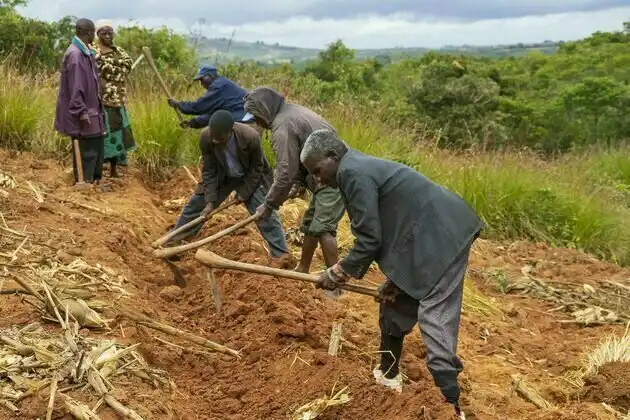Malawi farming experiment boosts maize yields and improves soil
Malawi farmers struggle with unpredictable weather and failing crops. Research shows intercropping legumes in deep beds improves soil fertility and yields.
Malawi is facing challenges due to unpredictable rainfall and higher temperatures, impacting smallholder farmers. Soil erosion is on the rise, leading to decreased soil fertility and water availability, resulting in crop failures.
The majority of farmers in Malawi depend on smallholder farming for their livelihood, with agriculture contributing to a significant portion of the country's GDP. However, many farmers struggle financially, unable to afford chemical fertilisers to improve soil fertility and sustain yields.
In an effort to address these challenges, soil fertility and sustainable development specialists, along with researcher Augustine Talababie Phiri, conducted trials in northern Malawi. They found that growing maize with cowpea and pigeon pea in raised "deep beds" significantly improved soil fertility compared to traditional farming methods.
Deep bed farming involves breaking up the compacted soil hardpan to allow plant roots to grow better. Planting seedlings on raised beds also helps retain moisture, resulting in higher maize yields. Intercropping legumes with maize further enhances soil fertility, as legumes naturally fix nitrogen in the soil.
The combination of deep bed farming and intercropping not only improves soil quality but also increases crop yields. This method reduces farmers' reliance on expensive chemical fertilisers, making farming more sustainable and cost-effective. Additionally, it promotes greater food diversity and nutrition, benefiting both farmers and consumers.
By adopting innovative approaches like deep bed farming and intercropping, farmers in Malawi can mitigate the effects of climate change, improve soil health, and increase agricultural productivity. These practices offer a promising solution to the challenges faced by smallholder farmers in the country.











Comments on Malawi farming experiment boosts maize yields and improves soil